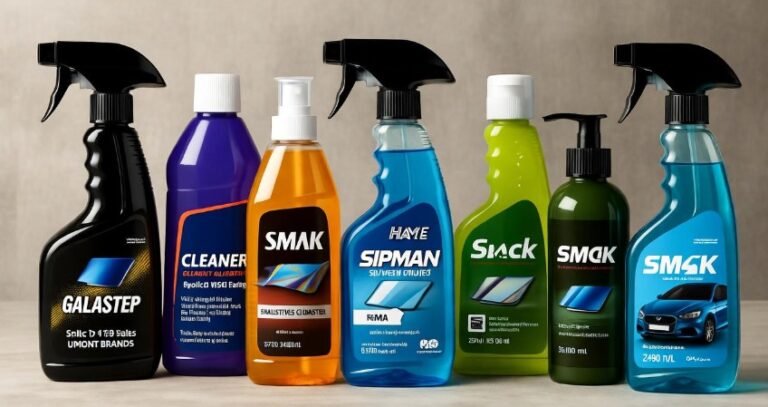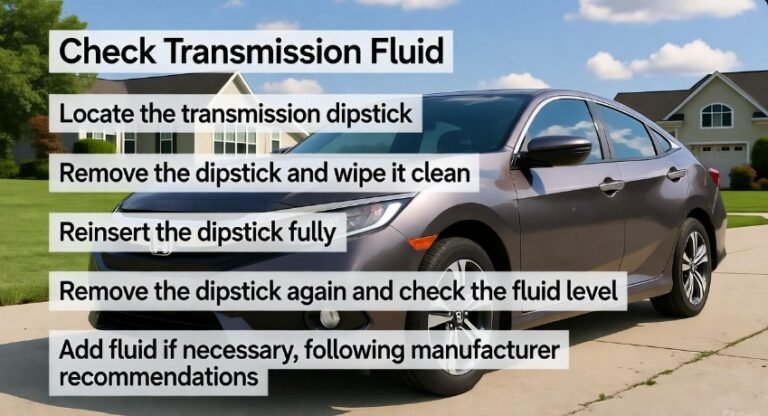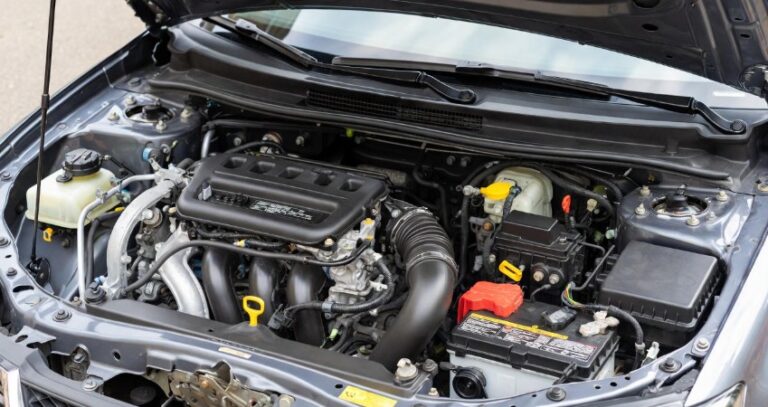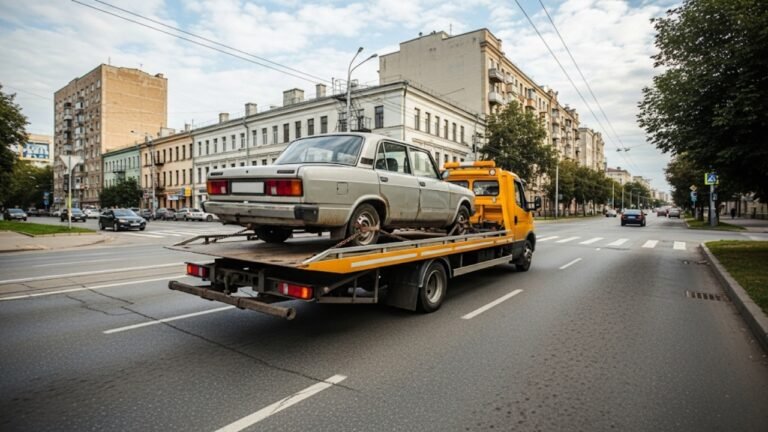How to Get a Replacement Car Key: The Simple Guide
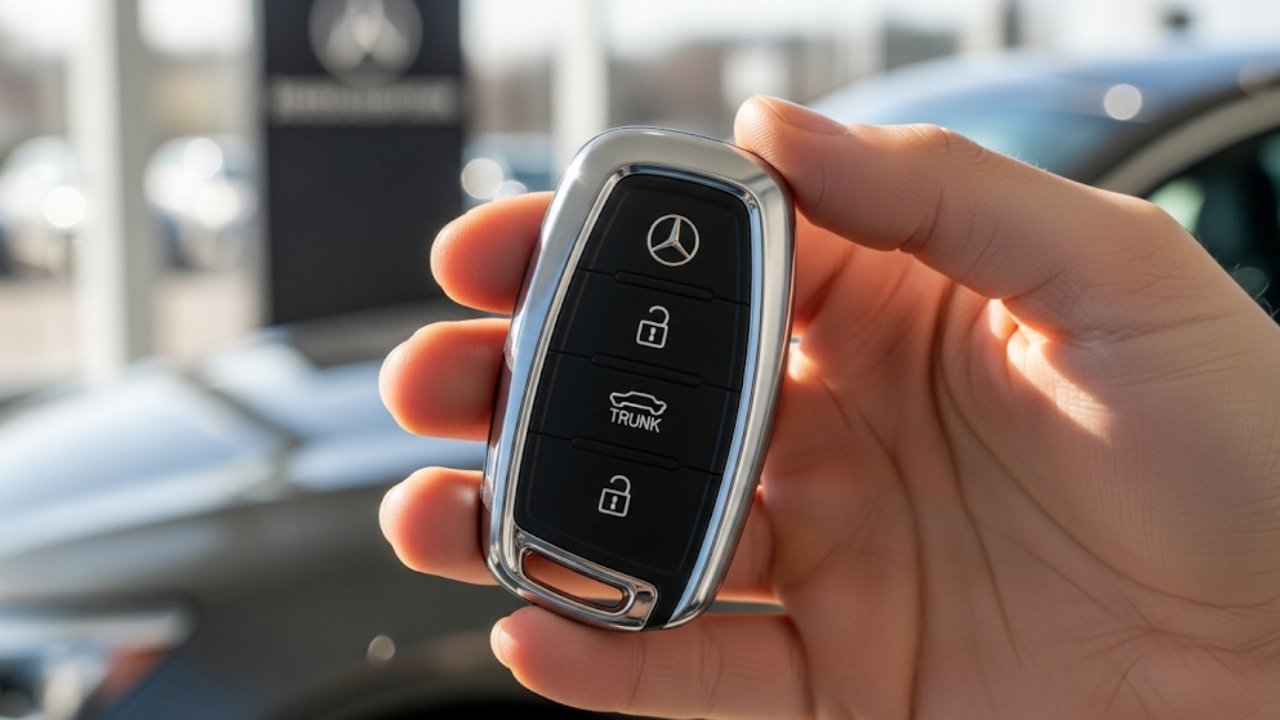
Losing your car key can feel like your entire day just hit a wall. You pat your pockets, dig through your bag, retrace your steps — still nothing. We’ve all been there. That sinking feeling hits hard, especially when you’re already late or stuck far from home. The good news? Getting a replacement car key doesn’t have to be complicated or expensive — if you know what you’re doing.
This guide is here to make the process feel less like a puzzle and more like a checklist. Whether you’re holding a worn-out fob, dealing with a snapped key, or staring at your steering wheel in disbelief, we’ll walk you through your best options — step by step.
We’ll break down types of car keys, costs, your choices (dealerships vs locksmiths), and even ways to save money and time. Along the way, expect helpful tables, FAQs, and a few personal stories you might relate to. So buckle up — your replacement car key solution starts here.
In This Article
- 1 The First Question: What Kind of Key Did You Lose?
- 2 Option 1: Dealerships – Trustworthy, But Pricey
- 3 Option 2: Automotive Locksmiths – Faster and Often Cheaper
- 4 Option 3: DIY Online Key Replacement – Cheap, but Risky
- 5 What If You’re Locked Out and Have No Spare?
- 6 Key Replacement Costs: A Deeper Breakdown
- 7 Can Car Insurance Cover Key Replacement?
- 8 Avoiding Future Key Disasters – Practical Tips
- 9 Smart Keys and Programming: What You Need to Know
- 10 Key Coding vs. Key Cloning – What’s the Difference?
- 11 What If Your Car Key Was Stolen? (Not Just Lost)
- 12 Legal Requirements: What You’ll Need to Get a Replacement Car Key
- 13 FAQs – Quick Answers to Common Questions
- 13.1 Q1: Can I get a car key replacement without the original?
- 13.2 Q2: How long does it take to get a replacement car key?
- 13.3 Q3: What if I have a key but the remote/fob part doesn’t work?
- 13.4 Q4: How much does a smart key replacement cost for luxury cars?
- 13.5 Q5: Is it safe to buy car keys from Amazon or eBay?
- 13.6 Q6: Can roadside assistance help with lost keys?
- 13.7 Q7: Can I program a car key myself?
- 13.8 Q8: Is cloning a key legal?
- 14 Helpful Tips to Avoid Future Key Woes
- 15 Final Thoughts: You’re More in Control Than You Think
The First Question: What Kind of Key Did You Lose?
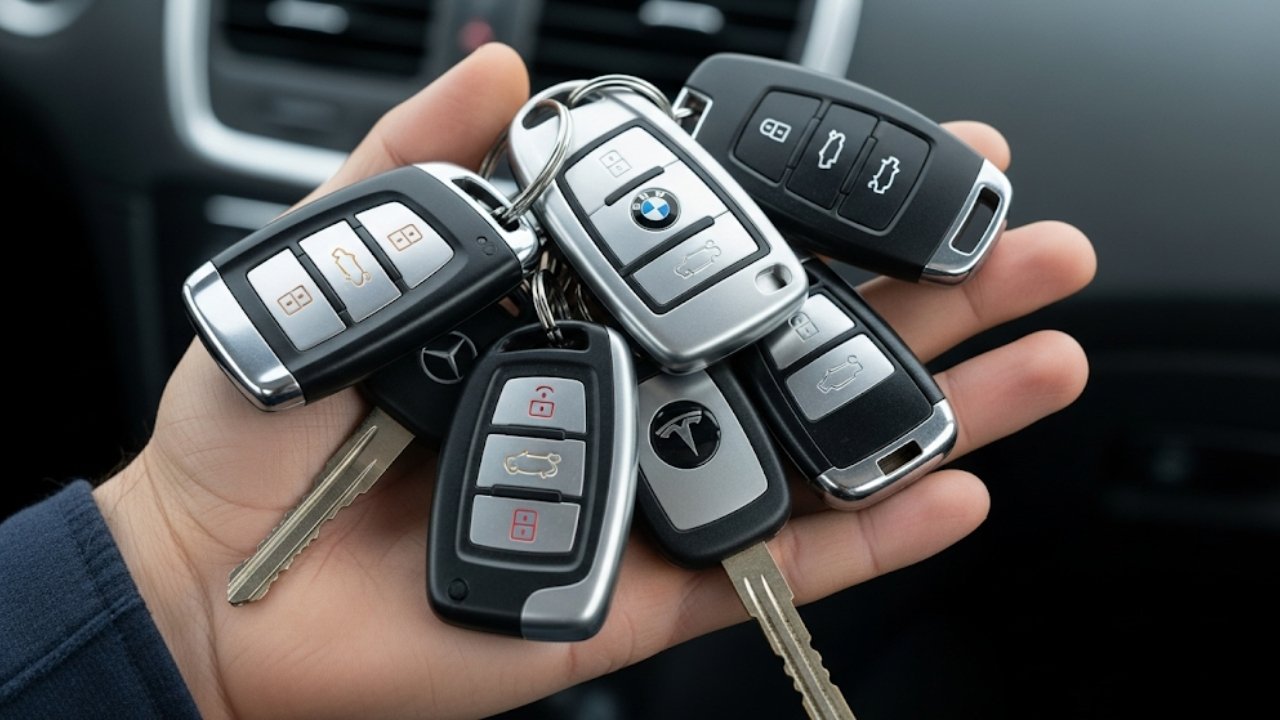
Types of Car Keys:
| Key Type | Description | Replacement Cost (Avg.) |
|---|---|---|
| Traditional Key | Metal, no chip. Used in older cars. | $10–$50 |
| Transponder Key | Metal + chip that communicates with the car. | $75–$200 |
| Remote Key Fob | Buttons + chip, no blade. | $100–$300+ |
| Switchblade Key | Foldable key + remote combo. | $150–$300 |
| Smart Key (Proximity) | Push-to-start fob, advanced security. | $200–$500+ |
Knowing your key type is the first real step. If you’re not sure, check your car manual or call your dealership with your VIN (Vehicle Identification Number). Or just look at your spare key — if you’re lucky enough to still have one!
Option 1: Dealerships – Trustworthy, But Pricey
Let’s be honest — the dealership feels like the “safe” choice. You know the service will be official. They’ll have the tools. But it’s going to cost you.
Most dealerships charge a premium for replacement car keys, especially if programming is involved. They may also require proof of ownership and personal ID, so be ready with:
-
Vehicle registration
-
Driver’s license
-
VIN (usually found on your dashboard or insurance card)
Expect a waiting time, especially if the key needs ordering from the manufacturer.
✅ Pros of Using a Dealership:
-
OEM (Original Equipment Manufacturer) parts
-
Accurate programming
-
Peace of mind
❌ Cons:
-
Expensive
-
Slow service
-
Inconvenient locations
Example: My cousin once lost the smart key to her Nissan Altima. The dealer quoted her over $450 and told her it’d take 5 business days. She eventually caved — but wished she knew other options.
Option 2: Automotive Locksmiths – Faster and Often Cheaper
Here’s the part most people don’t realize — a certified automotive locksmith can often do exactly what a dealership can, at a fraction of the cost.
Locksmiths have access to advanced key programming tools. Many offer mobile services — they’ll come to your car, cut and program a key on the spot, and get you back on the road within an hour.
If you’re dealing with a lost or broken car key, this is usually your smartest bet.
How to Choose a Reliable Locksmith:
-
Look for locksmiths with “auto key programming” experience
-
Check Google reviews and ratings
-
Ask if they’re licensed and insured
-
Request an upfront estimate
✅ Pros of Locksmiths:
-
Cost-effective
-
Mobile service available
-
Fast turnaround
❌ Cons:
-
Risk of unlicensed or shady providers
-
May not have all fob models in stock
Tip: Avoid locksmiths that don’t list a physical address. And never pay in full upfront.
Option 3: DIY Online Key Replacement – Cheap, but Risky
If you’re handy (and a bit adventurous), you can order a replacement key or fob online — eBay, Amazon, or specialty sites like CarAndTruckRemotes.com.
But here’s the catch — even if you get the key, you’ll still need to cut it and program it. Some keys require special diagnostic tools to link with your car’s onboard computer.
When DIY Might Work:
-
You already have a working spare
-
Your car allows manual programming (older models)
-
You’re comfortable following YouTube tutorials or forums
But Beware:
-
Some keys arrive unprogrammed
-
Programming may need dealer or locksmith
-
Quality and compatibility vary wildly
Bullet Tip: Always check your car’s year, make, and model before buying online. Even one digit off can mean a non-functional fob.
What If You’re Locked Out and Have No Spare?
This is the worst-case scenario — but not the end of the world. If you’ve lost your only key and can’t access the car, here’s what to do:
Steps to Take Immediately:
-
Stay Calm – Panic doesn’t help.
-
Call a Mobile Locksmith – They can often unlock and reprogram a key on-site.
-
Verify Ownership – Have your ID and VIN ready.
-
Avoid Towing if Possible – Locksmiths can save you hundreds by coming to you.
Real Talk: I once left my only key in a rental cottage two states away. No spare. No time. A mobile locksmith had a new fob in my hand in under 90 minutes. Cost me $180 — way cheaper than a dealer tow-and-program fee.
Key Replacement Costs: A Deeper Breakdown
Depending on your car type and your method, replacement car key costs can vary wildly.
| Replacement Method | Average Cost | Notes |
|---|---|---|
| Dealership | $150–$500 | More for luxury brands |
| Auto Locksmith | $75–$250 | Best balance of cost & speed |
| Online Key (Uncut) | $20–$100 | Add cutting & programming fees |
| Insurance Coverage | Varies | Only if included in policy |
| Roadside Assistance | $0–$100 | May include basic key help |
Can Car Insurance Cover Key Replacement?
Surprisingly, yes — in some cases. If you have comprehensive coverage, your car insurance may help cover replacement car key costs, especially if they were stolen.
Some insurance companies also offer key protection add-ons, usually for a few extra bucks per month.
What to Ask Your Insurer:
-
Does my policy cover lost/stolen car keys?
-
Is there a deductible?
-
Are locksmith costs included?
-
How do I file a claim?
Just don’t forget — claims can raise your premiums. So weigh the long-term cost before filing.
Avoiding Future Key Disasters – Practical Tips
We all lose things — but some smart steps can help you avoid this headache again.
Key-Saving Tips:
-
Have a Spare Made: Always. Even if you think you’ll never need it.
-
Use a Bluetooth Tracker: Tile or Apple AirTag can help you find lost keys fast.
-
Designate a Key Spot at Home: Consistency saves time.
-
Store a Key Code Card: This tiny card has your key’s cutting code — useful for locksmiths.
Smart Keys and Programming: What You Need to Know
Smart keys have become the norm in newer vehicles — they let you unlock and start your car without even touching the key. But they come with one big downside: replacing and programming them is trickier than traditional keys.
How Smart Key Programming Works:
Smart keys use RFID technology and rolling codes to communicate with your car. When you replace a smart key, it needs to be programmed to your car’s onboard computer system. That’s not something you can do with a screwdriver and a YouTube video — unless you have the right equipment.
Who Can Program Smart Keys?
-
Dealerships (always)
-
Certified automotive locksmiths (most)
-
Some advanced diagnostic shops
❗ Important:
Programming isn’t just about getting the car to recognize the new key — it often requires erasing the old key data for security. That’s essential if your key was stolen.
Key Coding vs. Key Cloning – What’s the Difference?
Ever heard someone mention “key cloning”? It’s not sci-fi — it’s a real method used to duplicate car keys, but it’s very different from key coding.
Key Cloning:
-
Copies the exact data from your working key.
-
No need to access your car’s computer.
-
Works only if you have the original key.
Pros:
-
Cheap and quick
-
No programming needed
Cons:
-
Less secure if the original key gets stolen
-
Doesn’t work with all smart key systems
Key Coding:
-
Requires syncing the new key to your car’s ECU.
-
Often deletes previous key access for safety.
Pros:
-
More secure
-
Works even if you lost your only key
Cons:
-
More expensive
-
Needs professional tools
What If Your Car Key Was Stolen? (Not Just Lost)
Losing your key is frustrating. But having it stolen is another story entirely. Now it’s not just about access — it’s about security.
If you suspect your car key has been stolen, take these steps:
Immediate Actions:
-
Report to Police: Log an official report. It helps if you file an insurance claim.
-
Reprogram Your Car: A locksmith or dealer can erase the old key’s data.
-
Get a New Key Coded: Not cloned — coded to your ECU.
-
Check Insurance Coverage: Some policies include stolen key protection.
Bonus Tip:
If your home address is connected to your vehicle documents (e.g., left in glovebox), consider changing your locks too. It’s rare, but smart thieves can use the stolen key to access both your car and your home.
Legal Requirements: What You’ll Need to Get a Replacement Car Key
You can’t just walk into a shop and get a car key cut. Locksmiths and dealerships follow strict protocols to avoid fraud or theft.
What You Need to Provide:
| Requirement | Why It’s Needed |
|---|---|
| Government-issued ID | To verify your identity |
| Vehicle Registration | To prove you legally own the vehicle |
| VIN (Vehicle ID Number) | Used to match keys and car details |
| Make/Model/Year | Helps locksmiths find the right key blank |
| Title or Insurance Docs (sometimes) | Extra ownership confirmation |
Where to Find Your VIN:
-
Driver’s side dashboard (viewed from windshield)
-
Inside driver’s door jamb
-
Vehicle registration papers
-
Insurance card
Always keep a photo of your VIN and ID handy in case you’re stuck somewhere without your physical documents.
FAQs – Quick Answers to Common Questions
Here are the most frequently asked questions about getting a replacement car key, answered in plain English.
Q1: Can I get a car key replacement without the original?
Yes, even if you’ve lost the only key, a locksmith or dealership can cut and program a new one using your VIN and proof of ownership.
Q2: How long does it take to get a replacement car key?
It depends on your method:
-
Locksmith: Usually 30–90 minutes
-
Dealership: 1 to 5 business days (especially for imports)
-
Online orders: Shipping + additional programming time
Q3: What if I have a key but the remote/fob part doesn’t work?
In that case, you only need fob reprogramming or battery replacement, not a full key cut. Many auto parts stores can help with this.
Q4: How much does a smart key replacement cost for luxury cars?
Luxury brands like BMW, Audi, Mercedes, and Lexus can run $300–$600+, especially if the system needs syncing at the dealership.
Q5: Is it safe to buy car keys from Amazon or eBay?
Sometimes — but you must ensure:
-
It’s compatible with your car model
-
The seller is reputable
-
You still have access to programming services locally
Q6: Can roadside assistance help with lost keys?
Yes, some roadside plans like AAA, Green Flag, or RAC include basic key services or towing to a dealership.
Q7: Can I program a car key myself?
Only if:
-
Your vehicle supports manual programming (usually older models)
-
You already have a working key
Smart keys and most modern cars require dealer-level tools.
Q8: Is cloning a key legal?
Yes, but only for personal use. Cloning someone else’s key without permission is illegal and can lead to criminal charges.
Helpful Tips to Avoid Future Key Woes
Let’s be honest — most of us don’t think about our car keys until we’re panicking in a parking lot. Here are some smart habits that can save you money and stress later.
Proactive Tips:
-
Always make at least two spares
-
Keep one in your wallet or with a trusted friend
-
Don’t attach key fobs to bulky keychains (they wear down ignition switches)
-
Check your key fob battery every 6–12 months
-
Snap a photo of your key’s tag code or RFID chip number
-
Store important vehicle documents in a secure cloud folder (like Google Drive)
Final Thoughts: You’re More in Control Than You Think
Getting a replacement car key might seem like a frustrating, expensive chore — especially if you’re caught off guard. But once you know your options, it becomes much easier to navigate.
Whether you go with a dealership for peace of mind, a locksmith for quick help, or DIY to save a few bucks — the key is preparation. No pun intended.
If you take away anything from this article, let it be this: make a spare today. It’s the one car accessory you never want to be without — until you are.


